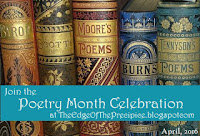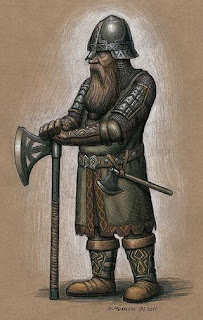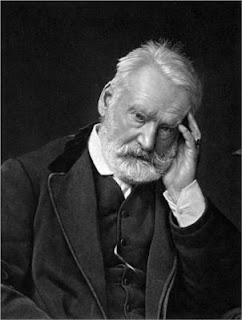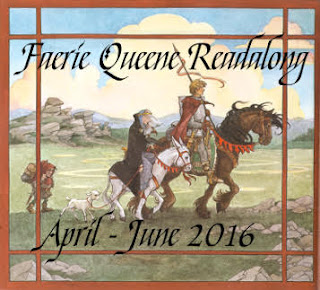Publius Ovidius Naso was born in Sulmo, east of Rome in the year 43 B.C. As a son of an upper middle class family, his father sent him to be educated in Rome to distinguish himself in a career in law or government. Ovid was known as an exemplary rhetorician and worked at minor magisterial posts before quitting his public career to pursue poetry. Immediate success followed his first published elegy and by 8 A.D., the year in which Metamorphoses was published, he was one of the foremost poets of Rome.
Category Archives: Poetry
An Anglo Saxon Riddle for Poetry Month
For April Poetry Month, I’ve been hunting for a poem, a haiku that I wrote when I was fifteen to post here as a personal poetry selection. Well, so far I’ve had no luck finding it, but while searching I found a poem written by my daughter, modelled on the epic, Beowulf, so I thought I would post it instead. She wrote it in grade 5.
Since trying to follow the Anglo Saxon meter (which goes by stress-count [stressed syllables] rather than syllable count, which would be two main stresses in each half of a line) was beyond her at that time, instead she focussed on alliteration and kennings.
Kennings create expressive imagery, using compound words and phrases that identify nouns. They are often colourful to generate evocative images in the mind of the reader. Because of their usual quality, kennings help the listener/reader to remember important happenings or people and also were used to avoid superfluous repetition, making the poem more developed and creative.
And as to the answer to the riddle, you can find it in the following paintings:
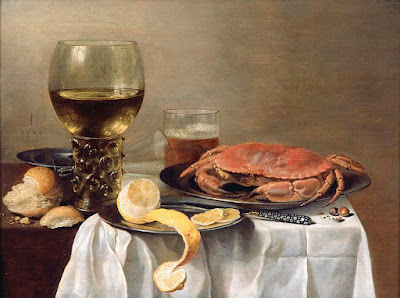 |
| Nature morte au crabe (1643) Pieter Claesz source Wikimedia Commons |
 |
| Breakfast with a Crab (1648) Willem Claeszoon Heda source Wikimedia Commons |
 |
| Still Life (1655-59) Pieter de Ring source Wikimedia Commons |
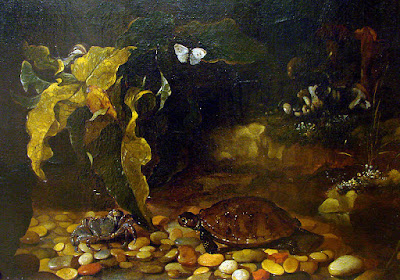 |
| Tortue et crabe (c. 1656) Paolo Porpora source Wikimedia Commons |
 |
| Still Life with shrimps and crabs on a tin plate (1641) Alexander Adriaenssen source Wikimedia Commons |
 |
| Albrecht Dürer source Wikimedia Commons |
Metamorphoses ~ Book XV
Book XV
 |
| Claude Lorrain source Wikimedia Commons |
Numa becomes king of Rome, and since he has cemented the laws and customs of Rome, he now decides to study the laws of nature. Leaving Cures, he travels to Croton where an elder tells him the story of the founding of the city. Hercules on his way back to Croton, stopped at Cape Lacinium. As he grazed his cattle, he pronounced a prophesy that in two generations time, a city would rise on that spot, and it came to pass. Myscelus, son of Alemon, was born, loved of the gods. One night as he slept, Hercules stood over him, commanding him to seek the distant Aesar. Myscelus found himself in a terrible conflict. It was forbidden him to leave his homeland on pain of death, yet Hercules had issued threats if he did not obey. Myscelus called out to the gods for help and their vote freed him. Reaching Aesar, he established Croton, building walls about it as Hercules commanded, founding this Greek town on Italian soil.
Narnian Suite by C.S. Lewis
For my second poem during National Poetry Month, I read C.S. Lewis’ Narnian Suite.
 |
| The Giant Antaeus (1868) Gustave Doré source Wikiart |
There is not much information on this poem to quench our curiosity as to how it ties to Narnia. Tirian in The Last Battle sings a short “Narnian marching song”, very much like it:
“Ho, rumble, rumble, rumble, rumble
Rumble drum belaboured.”
The Last Battle was finished in the spring of 1953 but not published until 1956 and Narnian Suite was written in 1953. Perhaps Lewis simply attempted to take the original marching song and expand it. In any case, it’s all speculation at this point; I may come up with some reference to it as I read through Lewis’ letters (yes, three huge volumes with a fourth soon to be published).
Does anyone think that this poem sounds very much like Tolkien’s poems in The Lord of the Rings? I do, but I am reading The Lord of the Rings presently, so perhaps I have that tone lingering in my head.
Metamorphoses ~ Book XIV
Book XIV
Passing the Cyclop’s fields, Messina, and that dangerous strait that separates Ausonia and Sicily, Glaucus streaks through the Tyrrhenian sea until he reaches Circe‘s palace. He tells of her of his woe and the fleet foot of Scylla who spurs his advances, but the goddess is enraged that he can only love Scylla and not her. Chanting infernal spells of Hecate, she heads for Rhegium across from Messina, polluting Scylla’s favourite pool with noxious poisons. As soon as the girl immerses herself, she sees snarling barking dogs in the water. Leaping up and running, she is astonished that she cannot escape them, finally realizing that they are part of her lower quarters. Glaucus flees in anguish but Scylla remains, and it is she who snatched up Ulysses’ men for revenge on Circe (see The Odyssey Book XII). She would have swallowed all the ships that passed if she hadn’t been changed into a rock, but even then, sailors fear her presence.
Poetry Month Tag
The Poetry Month celebration has begun at The Edge of the Precipice, and Hamlette has posted a tag with a few questions to answer. Poetry and I aren’t close friends yet, but we’ll see how I do ….. Fortunately the first questions is easy!
For my first poem of the month, I’m going to read Narnian Suite by C.S. Lewis because I’d never heard of it before and surprisingly it seems very Tolkien-ish. Since they were part of the Inklings, a group that met together and read their writings to each other, it’s perhaps expected that certain styles and tones of writing, might have rubbed off on each other.
Metamorphoses ~ Book XIII
Book XIII
Ajax and Ulysses contend for the armour of the fallen hero, Achilles. In spite of proclaiming himself a man of action and not one for florid speech, Ajax commences a rhetorical banquet, listing all his ancestors and spewing vitriol against Ulysses. Ajax’s father is Telamon, who was friend to Hercules as he destroyed Troy’s walls, sailed in the ship with Jason and was born of Aecus. In fact, he is a descendant of Jove, a honour he shares with Achilles, etc., etc. Ulysses is nothing but a smooth talking, lily-livered, cowardly, sneaky, dishonest fraud. Oh, and all his feats are minor. In fact, he, Ajax, should be the winner of the armour because his own shield is so damaged with fighting, yet Ulysses’ shield is so little used. He suggests that the armour be thrown among the Trojans and whoever reclaims it, be it him or Ulysses, will be the victor.
The Morning of Life by Victor Hugo
My ninth choice for my Deal Me In Challenge comes from “diamonds,” my poetry section. I have completely avoided my short story section so far, not out of design, but out of fate. I just haven’t chosen a club yet. In any case, for this choice we move to France and the poetry of Victor Hugo.
Metamorphoses ~ Book XII
Book XII
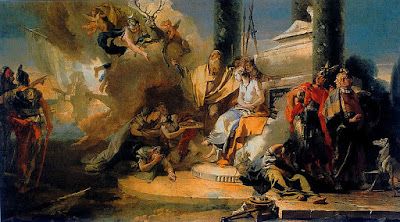 |
| The Sacrifice of Iphigenia (1770) Giovanni Battista Tiepolo source Wikimedia Commons |
The Faerie Queene in Poetry Month ~ Two Events!
As you’re probably aware from both my On Reading the Faerie Queene and Spenser’s Images of Life posts, I’m gearing up to read The Faerie Queene in late April. But instead of sliding quietly into the read-along, I thought it might be nice to give it an official announcement!
O at Behold the Stars was the instigator of this event and Jean, Cirtnecce, Ruth, Consoled Reader and I quickly followed her lead. We will be attempting to stick to this schedule:
Thanks to O for the prod, and to Jean’s husband for creating a rather awesome button! Anyone else who would like to join us is very welcome! Reading this tome among friends will make it much less intimidating!
And, coincidentally corresponding with the above read, in April Hamlette from The Edge of the Precipice is going to be hosting a Poetry Month Celebration in honour of National Poetry Month.
We’ll be starting The Faerie Queene read-along near the end of the month, but I hope to be able to read a few more poems, at least one per week, for this event. It’s a good chance to focus on that category for my Deal Me In Challenge.
So if either of these events interest you, I hope you’ll join us for a very busy April, and ring in the spring with poetry!



